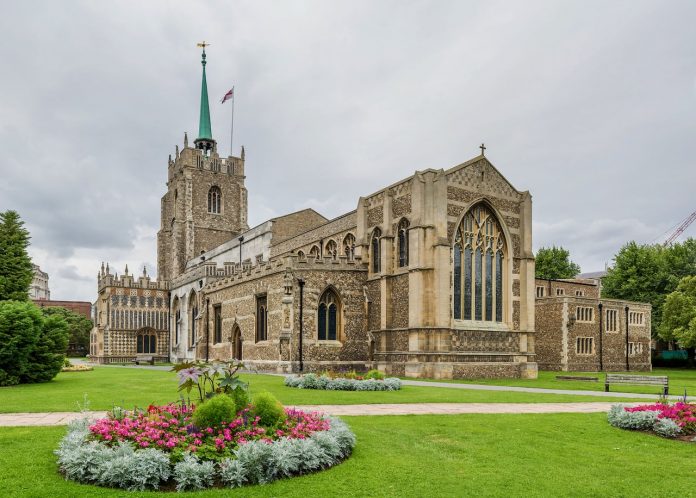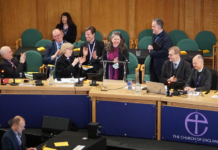Before being published, this statement, which includes the Visitation Panel’s Recommendations and her own Directions, was read by the Bishop at an open meeting in the Cathedral on 24th April when there was also an opportunity for questions.
The Visitation Panel was led by Bishop Tim Stevens who was assisted by Charles George KC, Canon Jessica Martin and Ms Juliet Taylor.
I’m grateful to you all for making time today for me to share with you the content of the recent Visitation Report and to outline how I think this should now be taken forward. You will know that the Visitation Panel, led by Bishop Tim Stevens, was in Chelmsford at the end of January and they heard evidence from nearly sixty people, both from within the Cathedral and from partners, stakeholders, civic leaders and many of the Bishop’s Leadership Team. They also received thirty written submissions, and, in addition, attended Cathedral Evensong and the Sunday morning Eucharist while they were with us.
I realise many of you will have been wondering about what the Visitation Report contains and you may have been speculating about the delay in giving you an account of it. I can assure you that there was no reason for the delays other than the inevitable amount of time these things take because diaries are pressed.
The Visitation Panel worked hard during February and the first half of March to produce the Report for me, and I have had the opportunity to discuss it at length with Bishop Tim. I have also shared the Report with the Interim Dean, the Cathedral COO, the Diocesan Secretary and the Registrar. Some of you may have wished to see the publication of the full Report as I received it. However, there are several reasons why I have decided not to publish it. The first, and most important, is that those who were invited to give evidence were assured by the Panel that their evidence would be treated in strict confidence. I believe this was a wise decision which enabled many people to speak without reserve to the Visitation Panel. Secondly, the Report has been designed for me, as the Bishop, and full publication would run the risk of the Panel’s observations being misinterpreted or misunderstood out of context. That is why I welcome this opportunity to talk to you about it and to take your questions.
It is good that the Report has much to say which is positive. It recognises many good and encouraging things in the life of our cathedral. At the same time, it acknowledges the pain and disturbance that some have felt under the recent pressures of cathedral life and especially since the pandemic. It therefore makes a number of recommendations which I will share with you shortly.
In their Report, the Panel emphasised their impression of a Cathedral Staff Team deeply committed to the life and vision of the Cathedral and they recognised also that there are many different organisations and constituencies which value the Cathedral enormously and look to the Cathedral as a gathering place for many communities across the Diocese.
So, I want to add my own personal thanks to all of you for your work and your contribution to the life of this Cathedral. I know that recent years have been especially demanding following Covid, changes in leadership and many other challenges which have come our way. My purpose in sharing the content of the Report is to enable us to move forward together, to build trust, and to capture a vision for the next stage of the Cathedral’s life.
The Visitation Report explores in some depth the Cathedral’s role as a Diocesan institution. It recognises that cathedrals must take account of the leadership agenda of the Diocese as it changes and it must also take account of its role as the seat of the Diocesan Bishop. In a very large diocese like ours, with its huge demographic spread from inner city East London to rural north Essex, a cathedral is bound to be stretched if it seeks to be a place where very different cultures and communities can find a spiritual home. The Report recognises this challenge for our cathedral and acknowledges the achievement of Nicholas Henshall in seeking to fulfil the remit he was given both to stretch the Cathedral in its role for the whole Diocese and as a credible partner in the public square. Our civic leaders in the City and the County have clearly given appreciative evidence to the Panel about their experience of major events in the Cathedral and of the value they place on its life and witness.
However, the Report also recognises the price that has been paid for this ambitious agenda, acknowledging that it led to unrealistic expectations being placed upon some key members of staff and on job descriptions and responsibilities which sometimes were stretched beyond what was reasonable or sustainable.
So, the Visitation Report explores in some detail the role of cathedral governance and especially of the Chapter in ensuring the wellbeing of all the staff as agendas change and new challenges emerge. This is especially important at this moment as the Cathedral prepares to develop its governance structures to be compliant with the Cathedrals Measure 2021. In summary, the Measure emphasises the role of the Chapter in ensuring that appointments, staff accountabilities, financial controls, and a developing vision are all subject to the kind of open but rigorous scrutiny which you might expect in any comparable charitable or voluntary sector organisation.
Let me share with you the five key findings in relation to Chapter which the Report emphasises:
- The Chapter should have a role in reviewing the job descriptions of Residentiary Canons and in monitoring the performance of their roles. It is clear that the Panel were left with concerns about the recent experience of two of our former Residentiary Canons and have pointed to specific ways in which, going forward, appointments can more effectively be monitored and supported. More widely, a new Nominations Committee will be established by the new Cathedral Constitution and Statutes required under the new Measure, and that will have a role advising the Chapter on certain matters relating to recruitment and training.
- The Panel is clear that the Chief Financial Officer has maintained proper control of expenditure and receipts and that appropriate internal auditing procedures are in place. However, they raised some concerns about the extent to which the Chapter has actively engaged with strategic financial planning. They recommend that the Chief Financial Officer should be part of the team that reports directly to the COO and not to the Dean.
- The Panel strongly recommended that there should be closer working between the Cathedral Safeguarding Officer and the Diocesan Safeguarding Team to ensure that those responsible for safeguarding at the Cathedral are given the support they need for safeguarding to function well. Progress is already being made in this area.
- The Panel has raised questions about the effectiveness of communication between Chapter, the staff and the Cathedral congregation. While it is clear that some matters must be kept confidential, the Panel formed the impression that some members of staff felt they were working in an information vacuum and this was echoed by some members of the congregation. Accordingly, they recommend that work is put into the development of an effective and sustained internal communication system.
- The Panel raised questions about the extent to which the emerging situation in the Cathedral’s Music Department has been adequately monitored by the Chapter. They recognise that music of a high quality has contributed enormously to the functioning of the Cathedral and that in general a high standard has been maintained. However, they express concern about the absence of a full time Canon Precentor since 2017 which over time has led to some fragility developing in the Music Department. The Panel also want to encourage movement towards a proper complement of Director, Sub-Organist and Organ Scholar which could lead to a more proactive recruitment of front-row choristers whose number has reduced over recent years.
The legal requirements of the new Cathedrals Measure mean that there will be new appointments to the Chapter to strengthen the skills mix which will be needed going forward. One of those appointments – of the Senior Non-Executive Member of Chapter – is made by the Bishop after consultation with the Chapter. The Senior Non-Executive Member (SNEM) will have a particular responsibility in ensuring that concerns in Chapter are properly represented to me as the Bishop. The Report recognises the contributions which Chapter has made towards this new culture of governance already and the significant steps which it has taken in recent years. However, there have been, as you will know, times when staff have felt under significant pressure which has not been properly addressed and has resulted in some leaving their roles without feeling their concerns have been heard. So the Report also draws attention to the need for closer working between the Cathedral and the Diocesan Staff especially in the areas of Safeguarding and HR and points to the fact that, if resources were pooled more effectively, some of the more painful experiences of staff members in recent years might have been avoided.
In a few moments, I will share with you the explicit recommendations for action which the Panel have provided and which I have discussed in some depth with the Interim Dean, the COO and the Diocesan Secretary. However, before I do that I want to share three other observations which the Panel made. The first is about the way in which all institutions develop their own culture. The Panel observe that in healthy organisations, it is possible to challenge the leadership without being perceived to be a threat to the leader or the direction of travel. This can be particularly important in a small institution like a cathedral where those with passionate commitment to the cathedral’s life and ministry are working in close proximity day by day. That is why healthy debate within the Cathedral Executive and within the Chapter, which may include constructive robust challenge, are so necessary for the life and wellbeing of the Cathedral.
Another observation from the Visitation has been that current accountability processes have led to a situation where staff have not always known clearly what their responsibilities are, nor have they received any feedback as to the effectiveness of their work. Let me quote from the Report at this point: “The very loyalty, collegiality and sense of shared spiritual purpose that animates the Cathedral community seems also to have functioned as pressure to accept unsustainable workloads and stressful work contexts, without complaint. At the same time, unwelcome behaviours have sometimes gone unchecked in the absence of accountability and solid processes.” So, I hope that going forward there will be up to date and accurate role descriptions and regular and routine ministerial reviews for all clergy in the Cathedral, and that lay staff will receive effective and regular appraisals from the COO.
Finally, the Report examines the relationship between the Diocesan Bishop and the Cathedral. It will not surprise you to know that this can be a delicate relationship, given that under the Cathedrals Measure the leadership of the Cathedral lies clearly with the Dean and his or her colleagues, and governance with the Chapter. The Bishop is not directly involved in either of these processes, and let me be clear that I have no desire to try and become involved in that way, even if time permitted! However, the Cathedral is the location of the Bishop’s seat and the primary setting in which the gathering ministry of the Bishop takes place. It is regarded by the wider community as, in some ways, “the Bishop’s church” and in that sense I have responsibility for its welfare and wellbeing. In my demanding and full life as your Diocesan Bishop, I’m also aware that I need a ‘spiritual home’ where I can come and pray and be nourished by the scriptures and the sacraments. I hope this Cathedral can feel at home with its bishop and that my prayerful presence here can help you to feel at home with me.
What I would like to do now is to take you through the Recommendations and explain a little of the way in which I expect they will be progressed by the Chapter, led by the Dean and working closely with the Cathedral COO and other colleagues. A paper copy of this Statement which I am making today will be available for you to pick up (should you wish to do so) after this meeting is over. It will also be published on both the Diocesan and Cathedral websites, as well as being shared more widely, including in the View, next week. I also look forward to taking your questions in a few minutes. Above all, I hope the outcome of this Report and of this meeting will be a renewed confidence in the life of the Cathedral and its high calling in mission, ministry and service.
Finally, before addressing the specific recommendations, of which there are ten, I want to acknowledge that, in fact, progress has already been made in a number of areas in recent weeks. Many changes are already in place, moving us in the direction of the Recommendations and towards a culture of greater transparency, accountability and professionalism.
And so to the Recommendations of the Visitation Panel, all of which I formally adopt, and each of which is followed by my own brief commentary.
RECOMMENDATIONS
- The Chapter should spend time considering its role and how it can provide more effective governance of the Cathedral through its own accountabilities, procedures and relationships. This should include a review of its current terms of reference or delegated authority to the Exec.
This recommendation sits well within the work that has already started towards the new Cathedral Constitution and Statutes required by the new Cathedrals Measure. Chapter should continue to review its procedures in terms of transparency, clear communications, and the effective exercise of accountability.My hope would be that there will be six-monthly reviews of progress as the Chapter builds its membership and strengthens its governance responsibilities. I invite the Chapter, in accordance with its statutory duties, to review its proposals in connection with the general direction and mission of the cathedral.
- The Executive structure should be streamlined with the Chief Finance Officer role reporting directly to the COO.
This seems to me to be a sensible move for the Chapter to consider, bringing all lay cathedral staff within the remit of the COO’s leadership and management.
- Specialist HR advice and support should be introduced to the organisation as a priority, either through outsourced provision or the creation of a new role with a specific People focus:
- a formal and consistent performance management and appraisal system should be implemented throughout the organisation, supported by a ‘lessons learned’ culture;
- the Chapter should ensure that all Cathedral policies are regularly reviewed; once appointed the HR lead should ensure that they remain relevant, simple and user-friendly.
I have discussed this with the COO and the Interim Dean and have been assured that they are making progress as a matter of priority, including bringing greater clarity around job descriptions and organisational structure more generally. The Chapter should keep these matters under review.
- The Inclusivity policy should be supported by clear efforts on the part of the leadership to implement a culture of equity, trust and respect at all levels of the Cathedral.
This recommendation is about a degree of culture change and will require some targets and milestones so that change can be measured at an appropriate speed.
- The Chapter and Exec should consider what opportunities are available for closer working with the Diocesan Office, particularly in relation to HR and safeguarding.
I strongly support this Recommendation and believe that there is great potential in building the relationship between the Cathedral and the Diocesan Office though, inevitably, the question of affordability will need to be taken into account when considering structural changes.
- The Cathedral’s efforts to recruit volunteers to assist in its work are to be commended; it should now also consider creating a Major Donor Committee for those willing to fundraise for the Cathedral.
I believe there are individuals who could make a significant contribution to generating funds from major donors. Consideration should be given to whether a committee or sub-committee of Chapter should be established and I have asked the Interim Dean and the COO to discuss this matter more fully in the coming months.
- The Chapter should take steps to secure, in consultation with the Cathedral congregation, the appointment of Cathedral Wardens.
I strongly support the proposal for the reintroduction of Cathedral Wardens to provide a key voice for the congregation and the strengthening of links between the worshipping community and the Executive. We must recognise that Chelmsford Cathedral is also a Parish Church and it is right and proper that the voice of the congregation is heard clearly and that there is better communication between them and Chapter.
The current Cathedral Statutes provide for the election of three churchwardens (who are ex officio Cathedral Wardens) and a further three Cathedral Wardens, and steps should be taken promptly to fill any vacancies. It is my sincere hope that there will be candidates willing to offer their skills, experience and commitment in these important roles at this significant point in the life of the Cathedral, and I know their contribution will be valued.
- The Chapter and Exec should consider how decisions about the Cathedral and those working in it are communicated and ensure that a rigorous internal communications strategy is in place.
Steps should be taken to design and develop an internal communication strategy which meets the needs of staff and stakeholders across the Cathedral’s life.
- The Chapter and Exec should ensure that all major events are planned thoroughly and that risks are fully considered, addressed and mitigated from the outset.
My hope is that the Cathedral will continue to be ambitious in staging major events and that the lessons to be learned from the Gaia event are thoroughly reviewed and implemented.
- The Chapter should take steps to strengthen music-making within the Cathedral:
- priority should be given to the appointment of a permanent Canon Precentor role as soon as is practical, together with the appointment of a sub-organist and organ scholar;
- steps should be taken to encourage recruitment of new members of the Choir (both backrow, and boys and girls) and to ensure that the Choir Matron role is properly valued.
I share the extremely high value the Panel placed on music making in the Cathedral and, in considering this Recommendation, want to take the opportunity to thank, in particular, the Director of Music, James Davy, for his leadership in what has been an extraordinarily challenging time. As you know, Revd Seb Harries and Revd John Fry will, at the beginning of May, take up their part time roles as Interim Cathedral Precentor and Interim Cathedral Missioner. In the next few months I will be working with the Interim Dean and Chapter towards the appointment of a full time Residentiary Canon’s post. The appointment of a sub-organist and new organ scholar are already well under way.
In terms of the development and strengthening of the Choir, I believe that Chapter together with the Music Department should look more imaginatively at the future of music making in cathedrals generally and ours specifically. Any decisions need to be realistic, affordable and sustainable.
Those then are the Visitation Panel’s Recommendations which, together with my additional observations, constitute my formal Directions. I have asked the Interim Dean and the COO to work with Chapter to produce an Action Plan for how these Directions will be taken forward and their progress audited.
All that is left, is for me to thank +Tim Stevens and the other members of the Panel, as well as Nathan Whitehead who acted as Clerk to the Visitation, all those who were interviewed or provided written submissions, and of course all those who continue to contribute to the ongoing life of our Cathedral in any way. I am hopeful for the future of our relatively small but immeasurably precious Cathedral. May God bless her and make her a place of blessing, warm welcome and encounter with God for any who enter her doors.
+Guli Chelmsford
24 April 2023



